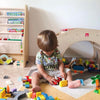Imaginative Play Benefits

At KidKraft, “Made for Make Believe” is our motto, so needless to say, imaginative play is near and dear to our hearts. We love it for so many reasons – the magic of seeing kids pretend, the silly ideas kids come up with, the memories of playing as a family. But we also love it for the developmental benefits. Here’s how imaginative play helps your child grow and thrive!
What are the benefits of imaginative play?
Creativity & Confidence
Play pretend with a three-year-old, and you’ll be sure to act out some truly silly situations. Pretend play lets kids build whole worlds and make the “rules.” Since so much of their life is directed by adults, pretend play is one of the few times they get to be in control. Whether they’re saving the day, starting a restaurant, or flying a spaceship, they relish the chance to call the shots and give you directions. Feel free to make suggestions, but ultimately follow their lead and encourage them to be as creative as they want!
Social Skills & Empathy
When kids engage in imaginative play with peers, they practice a lot of social maneuvering. They must communicate with each other as they establish how the pretend situation works, and they have to navigate real-life social dilemmas when they disagree.
Even when kids play pretend alone, they get a chance to put themselves into someone else’s shoes, something that doesn’t come naturally to a toddler. Imagining someone else’s perspective helps them build empathy and understanding.
Practical Life Skills
Pretend play helps kids learn how to interact in the real world. They can practice social interactions like ordering at a restaurant as well as basic tasks like caring for a pet or cooking. Pretend play is especially great at helping kids practice things they might not get the chance to do in real life just yet. When they are old enough to go school or order their own food, all of the pretend practice they had will help them navigate those situations with confidence.
Language & Vocabulary
Imaginative play comes with tons of opportunities to learn new words and expand language skills, especially when an adult is involved. Don’t hold back from using rich, specific language when you play with your kids. You might be surprised by how much they can pick up! For example, if you’re playing the part of veterinarian to your child’s teddy bear, don’t limit yourself to “boo boos” and “upset tummies.” Your child will learn more when you include terms like fractures, infections, sprains, and x-rays. You grow their vocabulary as well as their fascination with a subject when you use detailed language.
Types of Imaginative Play
Imaginative play can take several forms, including independent play, social play with peers, or social play with adults. Each has its own benefits. Independent play lets kids explore on their own terms and develop focus as they engage with what interests them most. Playing with peers builds social skills. Playing with adults can boost language and vocabulary development and provides opportunities for the adults to teach kids about the world through play.
Imaginative play can also take the form of dramatic play, where kids act out roles themselves, or play with toys, where kids speak for toys but don’t embody a role themselves. It can center around fantasy or real-world scenarios. Both are beneficial, allowing kids to explore their creativity and learn practical skills that will serve them in real life.
Shop Our Imaginative Play Toys
Of course, nothing is as important for imaginative play as your child’s own imagination! That being said, toys that promote pretend play can really help them engage in and enjoy imaginative play on a daily basis. For developmentally-friendly toys your kids will love playing with, check out KidKraft’s wide range of play kitchens, dollhouses, and other imaginative play toys. Just like your child, they’re made for make believe!





